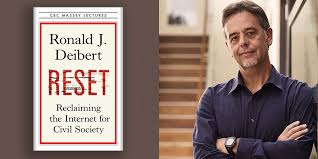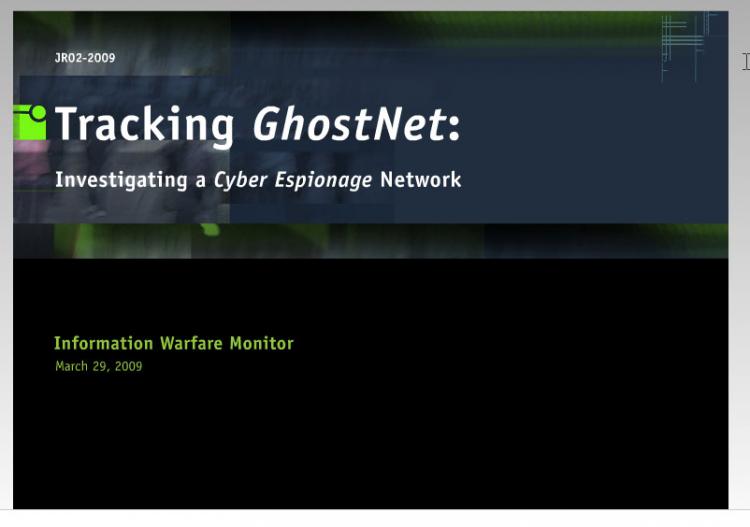Restraint to Reclaim the Internet
Saturday, October 31st, 2020Reset: Reclaiming the Internet for Civil Society, Ronald J. Deibert, 2020
Deibert is professor of Political Science and founder and director of the Citizen Lab at the Monk School of Global Affairs and Public Policy, University of Toronto. He is also co-founder and a principal investigator of the OpenNet Initiative and Information Warfare Monitor projects. He was one of the founders and former VP of global policy and outreach for Psiphon.
A central theme of this book is the growth and dominance of Surveillance Capitalism by a handful of enormously rich and powerful companies and individuals.
Today it is virtually impossible to protect yourself from privacy encroachment via the Internet even using tools like Tor or end to end encryption like that found on Signal and WhatsApp. When Citizen Lab researchers cross international borders they must totally erase their Chromebooks to prevent seizure of their work. Much of Citizen Labs work is uncovering security and privacy vulnerabilities in existing Internet products such as Zoom with vulnerable camera and microphone control and the big hack of 2020. A huge problem with the Internet is its dependency on multiple layers of independently developed software deployed without adequate attention to security issues and problems. Governments may compound the security problem by requiring exploitable back doors, promoting faulty encryption that they can break, or the forced disclosure of encryption keys as a precondition for use in their jurisdictions.
Using Privacy Badger, Deibert found fifteen trackers on LinkedIn and a comparable number of trackers on the New York Times “Privacy Project” site.
As I write this book, the nerves of our World Brain are vibrating with full-on assaults on truth, science, ethics, and civility.
It’s a perfect storm–tools that enable precise details about people’s preferences and habits; Sophisticated machines that can swiftly analyze and then manipulate data as points of leverage around human emotions; unethical companies willing to do anything for a profit; and clandestine government agencies that lack public accountability but do have big budgets and a blank cheque to use social media as an experimental laboratory for their dark arts. The potential implications of this perfect storm should be profoundly unsettling for everyone concerned about democracy, the public sphere, and human rights.
Receiving special attention here is Isreali-based NSO Group and their flagship spyware Pegasus which the Saudi government used to spy on Saudi dissident and exile in Canada student Omar Abdulaziz and his friend Jamal Khashoggi. Citizen Lab had a bead on the number of Pegasus infected phones and realized that one of those phones was in Montreal. Going door to door with a short list of Saudi dissidents in Montreal, they uncovered the needle in the haystack Omar Abdulaziz and were able to confirm that his phone was infected. It is more than likely that information from this infected phone informed Saudi intelligence of Omar’s conversations with Khashoggi and may well have led to Khashoggi’s assassination by MBS.
Deibert estimates that 90% of the most active campaigners in the 2011 Arab Spring have vanished, in large part due to the use of NSO Group’s spyware.
Citizen Lab was able to infect an Iphone with Pegasus spyware in a laboratory environment and to reverse engineer Pegasus itself.
The spyware was extraordinarily sophisticated; it included exploits that took advantage of three separate flaws in Apple’s operating system that even Apple was unaware of at the time…After disclosing the vulnerabilities to Apple, which pushed out a security patch to more than one billion users, and publishing our report on targeting Mansoor, we reverse engineered Pegasus and began scanning for and monitoring NSO’s infrastructure and government client base.
Finding exploitable flaws in operating systems can be sold for as much as $1 million.
Also receiving special attention is China’s security apparatus courtesy of the Chinese government obsession with the Tibetan refugees settled in Dharamsala particularly with the Dalai Lama. Deibert representing Citizen Lab made numerous trips to Dharamsala and had a personal audience with the Dalai Lama. Citizen Lab’s history studying GhostNet goes back to 2009 when China’s large-scale electronic espionage program used to spy on individuals, organizations, and governments was discovered. The threat actors breached 1,295 computers in 103 countries over a two-year period, predominately focusing on governments in Southeast Asia. Citizen Lab’s first report on GhostNet was issued in 2009.
…recent years have brought about a disturbing descent into authoritarianism, fueled by and in turn driving income inequality in grotesque proportions and propelling the rise of a kind of transnational gangster economy. There is today a large and influential class of kleptocrats spread across the globe and supported by a professional service industry of lawyers, shell companies, accountants, and PR firms, the members of which move seamlessly between the private sector and agencies of the state…They thrive by victimizing innocent others, undermining individuals and organizations that seek to hold them to account, and using the power of the state for personal gain. There is no jurisdiction that is immune to corruption and authoritarian practices–only greater or lesser degrees of protection against them.
…In fact, the most disturbing dynamics are playing themselves out within normally liberal democratic countries. Hyper-militarized policing practices that draw on big data and AI-enabled surveillance tools are creating states on steroids…Meanwhile the constraints on abuse of power seem quaint and old-fashioned, as if constructed for a different time and context. We now have twenty-first century policing practices with nineteenth and twentieth century checks and balances.
The growing critical commentary on social media and surveillance capitalism is at a stage similar to the environmentalism of the 1960s and 1970s. The works of Shoshana Zuboff, Siva Vaidhyanathan, Bruce Schneier, and others are, in this respect, the social media equivalent of Rachel Carson’s Silent Spring, Barry Commoner’s The Closing Circle, and Paul Ehrlich’s The Population Bomb. They have dissected what’s wrong and have helped wake us up to a serious pathology, but they have yet to carve out a confident alternative way to organize ourselves.
Commenting on Europe’s GDPR and California’s Consumer Privacy Act, Deibert says “However promising, these statutes on their own are not so much prompting a fundamental behavior shift as they are further trivializing informed consent.”
Thanks to the Snowden disclosures, we now know that a flawed encryption protocol was foisted clandestinely on much of the world by the U.S., Canadian, and U.K. signals intelligence agencies, which enable them to crack the code of their adversaries communications. Critical infrastructure throughout the world depended on the integrity of the protocol. It’s unclear how many governments or criminals knew of and exploited it, or whether people were harmed in the process–but it is conceivable some malfeasance took place because of it.
Deibert takes us into a brief history of “republicanism” from the Greeks to the U.S. founding fathers, to today. “…One shorthand way to think about republican political theory is to take virtually anything that Republican Senate majority leader Mich McConnell advocates and think of the exact opposite of that position.”
Critical to the proper functioning of civil society is an educated and fully informed, enlightened citizenry. With this in mind, Deibert presents the mission statement of his own University.
The University of Toronto is dedicated to fostering an academic community in which the learning and scholarship of every member may flourish, with vigilant protection for individual human rights, and a resolute commitment to the principles of equal opportunity, equity and justice…
Within the unique university context, the most crucial of all human rights are the rights of freedom of speech, academic freedom, and freedom of research. And we affirm that these rights are meaningless unless they entail the right to raise deeply disturbing questions and provocative challenges to the cherished beliefs of society at large and of the university itself…
It is this human right to radical, critical teaching and research and which the University has a duty above all to be concerned; for there is no one else, no other institution and no other office, in our modern liberal democracy, which is the custodian of the most precious and vulnerable right of the liberated human spirit.
Herbert Marshall McLuhan (July 21, 1911 – December 31, 1980) was a Canadian philosopher, whose work is among the cornerstones of the study of media theory. He joined the University of Toronto in 1946 and taught there until his death. Harold Adams Innis (1894 – 1952) was a Canadian professor of political economy at the University of Toronto and the author of seminal works on media, communication theory, and Canadian economic history.
Ron Deibert follows in an important tradition at the University of Toronto.



